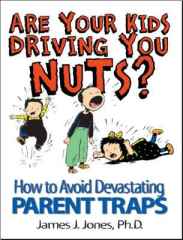I recently reviewed Are Your Kids Driving You Nuts?, a parenting book written by Dr. James Jones. He started a foundation called “Familyhood” that “is dedicated to strengthening individuals, marriages and family relationships”. In the book he has written, Jones focuses on principles of correct parenting.
A large portion of the book is about “parent traps”, which are “dysfunctional patterns of behavior parent often fall into when trying to get a child to.. 1. Stop an undesirable behavior or 2. start a desirable behavior.” Dr. Jones claims that parent-trap behaviors “seem to work at first, but they never build healthy relationships. Eventually they just make things worse.”
Since I have toddlers many of these “parent traps” did not relate to me because my children can’t say much yet. One I did read about that I felt was relevant to my life was the chapter on anger. I find myself getting angry sometimes with my children when they aren’t listening and I sometimes raise my voice. I always feel awful afterwards but I justify it with “he knows I love him still because I stress it’s his behavior I don’t like, not him”. As a parent I was devastated to read the words in this book that said, “Psychologists tell us that little children split. They cannot understand that Daddy can be angry and love them too. A young child cannot mentally hold and evaluated two concepts at the same time. So if Dad usually comes across as angry, they assume he is only angry and that he does not love them.” Then the book said, “They further conclude that something is wrong with them since Dad is angry at them. This has a negative impact on the child’s self-esteem, usually for life.”
I had never thought of it this way before. While I’m not 100% convinced that my anger now will impact their self-esteem for life, reading this chapter made me think about how I speak to my children and how I communicate my feelings. As I skimmed through the rest of this book I found other chapters that I would want to look at in the future including “parent-traps” such as nagging (chapter 14) and unrealistic expectations (chapter 23). With over 20 parent traps I think that most parents could find one or more chapters that they could relate to and find ways to improve their parenting skills.
(Disclosure: This post was written for Family Review Network & Family Impact who provided the complimentary product for review in exchange for my honest opinion.)


I love Dr. Jones! The one that has most stuck with me is “don’t lie”. Meaning don’t tell your child he won’t be able to go to the party if he doesn’t cleam his room, or that he’ll be grounded for a year, etc., unless you are willing to follow through.
Since implementing this, I now catch myself and say “Well….something is gonna happen! I don’t know yet what it will be, but when I calm down and figure it out, I will let you know.” This is a more honest approach.
I’m glad you found Dr. Jones’ work, too!